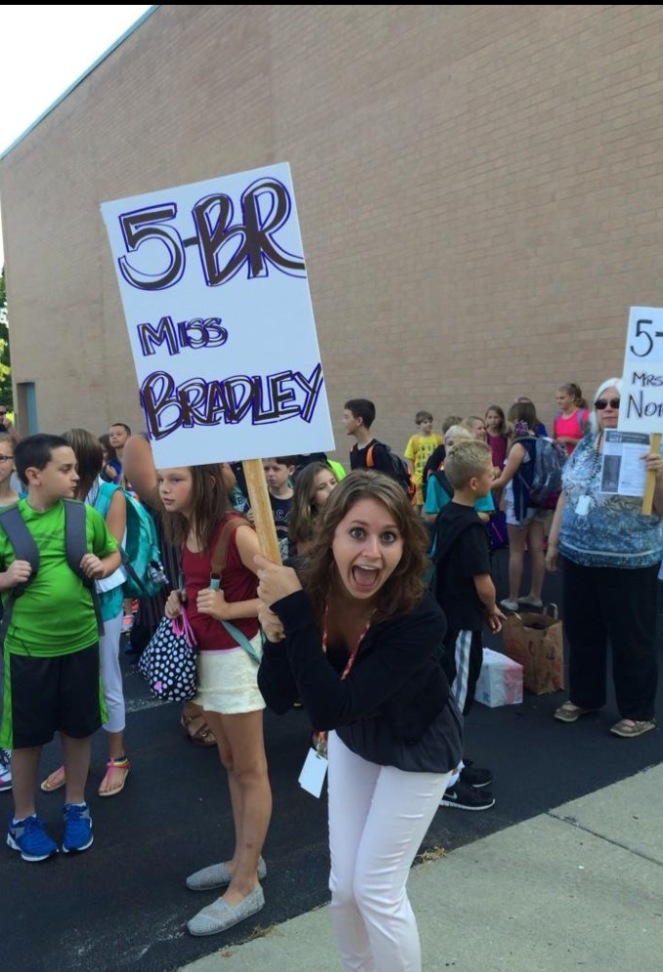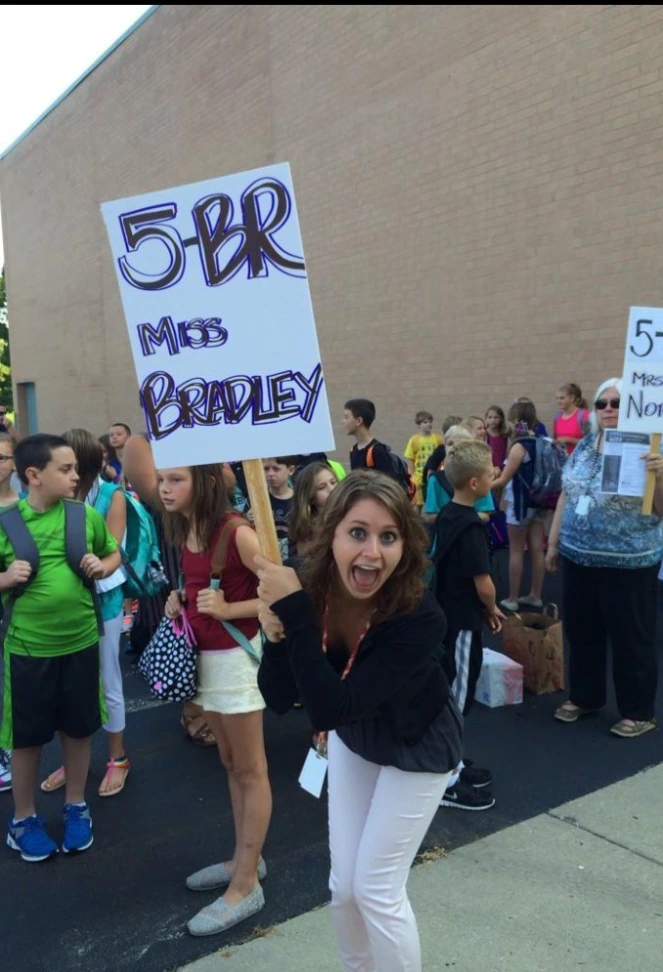Survival. Crying in the car. Rejoicing at the most minor milestones. Finding colleagues to lean on. Making teacher friends who get it. Late night grading. Wine. Chocolate. Crawling toward the finish line into summer break.
The first year teaching has been called many things. One thing I’ve never once heard it described as? Easy.
We accept this notion as a whole because this work we do really is that hard. Getting through that first year, looking back at the blur that it was, is as close to a rite of passage as anything I’ve ever known. It’s so trying that I know people outside of the edu bubble even know about it.
But what is it about that first year that make it so much harder than the ones that follow? You might say experience, and while that’s true, I’d argue that it’s not the only reason why. Switching content areas to one I’d never taught left me with no experience, but that first year in ELA still wasn’t nearly as challenging as my first year ever. So what, really, makes that first one so much different?
Our teacher preparation programs are, on the whole, relatively good. In Illinois, we have some pretty rigorous requirements for teacher candidates, which are matched in many states around the US. We have our pre-service teachers studying a huge variety of necessary information and learning a massive amount of crucial skills.
From classroom management, to literacy development, to differentiation for varied learners and abilities, our colleges and universities do a fine job of giving our future teachers the information they will need to run a theoretical classroom. They give tools to manage difficult behaviors, and ways to adapt instruction to meet the needs of their kids.
But they in no way prepare us for everything. Because, when you think about it, there’s no possible way that they could. And truthfully, a lot of what teachers experience on the job is unpredictable, impossible to prepare for.
There are so many facets of this profession that cannot be learned in a classroom setting, nor can they really be experienced through student teaching or clinicals with the oversight of a cooperating teacher. It’s almost impossible to imagine a scenario where we could learn some of this that isn’t our own classroom.
Things like creating and cultivating professional relationships, professional development opportunities, school culture, and work/life balance are pieces that can be alluded to and discussed (though they aren’t brought up enough in my opinion), but they cannot be directly taught. You aren’t necessarily going to walk into El Ed 200 one day and listen to a lecture on how to manage plan time so you aren’t grading for 4 hours at home.
This doesn’t really happen, mainly because there isn’t one particular “right way” of going about it, developing it, or engaging in it. These pieces are so unknowable, so undefined, that all we can do is muddle our way through when we get there.
However, this is not the case with everything. There were many unexpected aspects of my first year teaching that I definitely could have learned in my undergraduate experience, that I could have gotten from my cooperating teacher or supervisor, that I could have had a class on, and did not.
These various pieces are, in my opinion, entirely teachable. It could be just my experience, but I’m willing to bet I’m not alone. Writing sub plans, how to structure the first day of school, difficult conversations with parents, learning to create separation between work and home, how to handle home issues with students that are far worse than you could have anticipated… these are all pieces that I could have been much better equipped to handle.
Rather than spending multiple classes discussing the various ways to regain students’ attention, a class (or even multiple) on communicating with parents and doing it well would have been so much more helpful.
We rely heavily on veteran teachers to guide these first years through some of these avenues, and that’s not a bad thing. Some of the most sage advice and best learning I’ve ever had comes from my colleagues, and I feel fortunate for their experience.
But I do not believe that relying solely on this eradicates or negates the fact that we are effectively throwing people into a situation that we know is going to be hugely trying, and we are fully aware that they will be unprepared when they get there.
We hope that each new teacher will be met with open arms, positivity, kindness, and mentorship. But that doesn’t always happen. And even when it does, it sometimes isn’t enough.
So in the interest of being open and honest, I wanted to talk about some of the difficulties I faced in my first year. Both teachable and unteachable, things that could and should have been learned before I got in the classroom, and things that were impossible to know until I was there.
Now, I’ve heard from many of my colleagues that this was something discussed in their undergraduate experience, and I’m glad for them. But honestly, this is an easy one that should happen in every single undergrad program. I remember trying to write sub plans for the first time and being so freaking anxious about it. Am I putting too much? Will the sub think I’m crazy for spelling it out? But what if it isn’t enough? Am I supposed to script it? Like, will they know what to say? Why am I even doing this? I should just go in, it won’t be the same no matter what I do.
Exhausting. Yes, I know, sub plans are always a lot and it’s much more work to take the day off than it is to just go in. But holy cow, could I have benefitted from at least learning how to format them, or at least getting some idea of what they should look like! It hasn’t gotten any less intensive to put them together, but at least now I know how.
In line with the above, we never learn that even though sub plans are a pain, we really do need to use a sick day when we’re sick. Going into work sick does not result in great learning for your students because you just aren’t as effective when you’re not feeling up to it. Teaching requires a lot of energy, and you just don’t have it when you’re sick. Take the day. Write the plans. I promise it’s better to give yourself time to recuperate.
We’ve all had those experiences. The difficult conversations about behavior, failing grades, or some issue involving a student that has to be communicated with the student’s family. These conversations are never easy, nor will they ever be, but learning to navigate them successfully is something that can and should be discussed before we enter the classroom.
Learning to be sensitive while still being direct is a balancing act, and one that takes practice to master. I still struggle all the time with this, and often have to ask for input or help from my colleagues or administrators before sending or saying something.
It would have been hugely beneficial for me to learn some of the basics prior to actually communicating with families, especially if I didn’t have the support of other educators in my school.
Tough conversations with families regarding a student are a tightrope, and sometimes, things don’t go well. In these situations, tempers flare and it can be painful. I’ve been in this scenario, and it’s soul-crushing. Nothing will make you question your choice of profession and dedication to your students in such a personal, debilitating way.
But what can’t be taught is that in these situations, it isn’t always you. There are times when you can put your heart and soul into it, and there are just pieces that cannot be overcome by you. Sometimes, it’s out of your control. And in those times, you just have to let it go and move on.
I know that student teaching has been restructured in many places, and I am so glad. When I had to determine how the first day of school would run as the teacher, I realized that I had never participated in one from that perspective.
I had taken classes on classroom procedures and knew they needed to be established, but there was so much more to the first day than that. Getting to know your students, giving them important information, and answering the most important questions on every kid’s mind… When is lunch? And when can I go to the bathroom?
I wish I had the opportunity, before I was the teacher, to witness a first day of school through the lens of a pre-service educator. I believe I would’ve felt more prepared and may have picked up some ideas for my own use, rather than being thrown into the situation to figure it out on the fly.
I truly, truly hope this is being taught in teacher preparation programs now. This one is honestly teachable, but it wasn’t taught in my experience, and it really should have been.
Because when I went through my undergrad, I had an entire COURSE on managing classroom behaviors, and not once did we ever discuss the vitality of building legitimate relationships with kids.
We discussed rapport and respect (two outdated buzzwords now), but we didn’t delve into what it really means to create a classroom culture. We learned about a ton of ways to make sure students were all listening and what to do when they weren’t “attending to instruction”, but spent very little time discussing how crucial it is for students to value teachers as people.
In classrooms, middle school ones especially, if students don’t like you, they aren’t going to learn from you. If you aren’t your authentic, true self, you’ve already lost them.
And I wish someone would’ve told me that.
The first year teaching will always be difficult. But there are some aspects that we can do better for our future teachers and ways we can ease the transition a little bit.
Because it really is the best field in the world. You just have to get past that first blurry year to really see it.
 My first day of my first year… EVER.
My first day of my first year… EVER.


